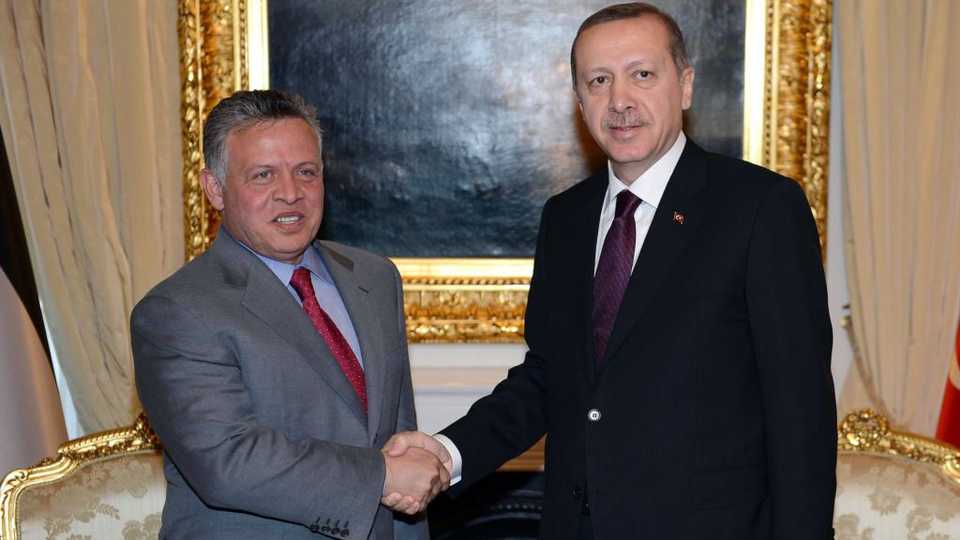
Jordan’s leader King Abdullah II will visit Ankara on Wednesday after an invitation by Turkish President Recep Tayyip Erdogan. The two will discuss bilateral relations and regional developments.
Abdullah’s visit comes on the 70th anniversary of the start of diplomatic relations between Turkey and Jordan.
The main reason for the visit is co-operation between the two countries on regional issues, including the Syrian civil war and Palestine.
Jerusalem heated up after Trump’s move
The Palestinian issue will top the agenda, after the Trump administration’s talks about moving the US embassy from Tel Aviv to Jerusalem.
President Erdogan harshly criticised US President Donald Trump on Tuesday over the possibility of the US recognising Jerusalem as the capital of Israel, which would be catastrophic and could lead to renewed conflict in the Middle East.
Erdogan cited that Jerusalem is the “red-line of Muslims.”
“We are warning the US once again. You cannot take this kind of step,” Erdogan added.
Jordan’s Minister of Foreign Affairs Ayman Safadi stressed the importance of preserving the historical and legal status quo in Jerusalem, pointing out the “grave consequences” of such a decision.
Palestinian president Mahmoud Abbas conducted a series of phone calls on Sunday with world leaders to “explain the dangers of any decision to move the embassy to Jerusalem or recognise [Jerusalem] as Israel’s capital.”
Israel considers Jerusalem as a single entity, but this is not internationally recognised. West Jerusalem has been Israeli territory since 1948, and a majority of the people who live there are Jews. East Jerusalem has been an Arab majority territory and has been run by Jordan since 1948.
Israel occupied all of Jerusalem in 1967, and extended the city’s municipal boundaries, placing both East and West Jerusalem under its sovereignty and civil law.
Jordan, after the Six-Day War (1967), took control of East Jerusalem and, since 1988, has renounced its claims to the West Bank, recognising the Palestine Liberation Organization (PLO) as “the sole legitimate representative of the Palestinian people.”
Jordan protects the Muslim and Christian holy sites in Jerusalem.
A UN resolution cited that Israel has occupied the lands that do not belong to it and attempts of changing the status of Jerusalem “are invalid and cannot change that status.”
The numbers of Jewish settlers who live in the West Bank and East Jerusalem is 600,000. The number of Palestinians living in these places is around three million.
Co-operation on the Syrian crisis
As one of the key states on regional development in the Middle East, Jordan is an active participant trying to end the seven-year civil war in Syria.
Jordan attends both Astana and Geneva meetings, which aim to solve the Syrian crisis. Amman also co-operates with Bashar al Assad’s regime to fight against Daesh in southern Syria.
Both conducted a land operation against rebel-held areas in Syria’s south-western region in December 2015. The operation was backed by Hezbollah with the aerial support of Russia near the Rukban border crossings.
Jordan has reached an agreement with the US and Russia for de-escalation zones in southern Syria as a continuation of the Astana Talks in May.
Turkey is also one of the brokers of another de-escalation zone, along with Russia and Iran. This de-escalation zone in Idlib was put into effect in October.

Jordan hosted the largest number of Syrian refugees until Daesh stormed Syria. Now it stands second following Turkey, hosting around 1.3 million people, while Turkey hosts more than 3.2 million refugees.
Economic relations
Ankara and Amman have built around $1 billion in trade volume, and both leaders seek to raise trade between their countries.
The two signed the Free Trade Agreement (FTA) that took effect in March 2011.
The total volume of Turkish investments in Jordan stands at $300 million and the total value of contracting works undertaken by Turkish companies is around $2.5 billion.
More than 40 agreements and memorandums of understanding have been signed between the two countries up until today, laying the legal framework for bilateral co-operation.










Discussion about this post